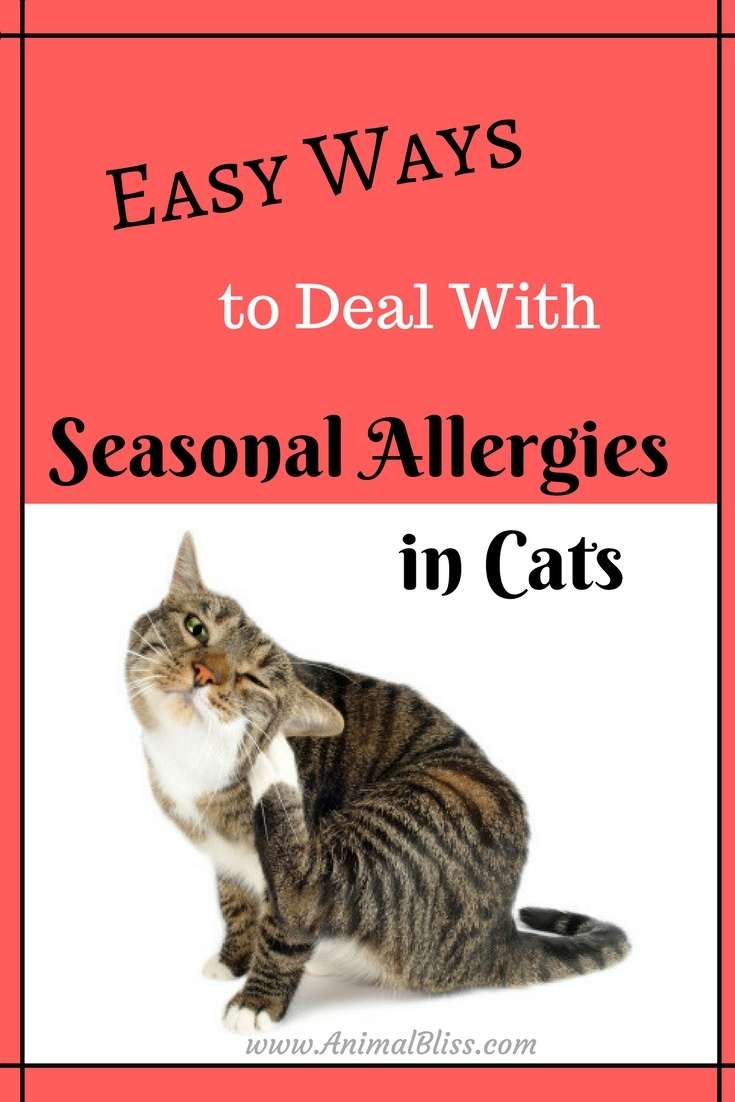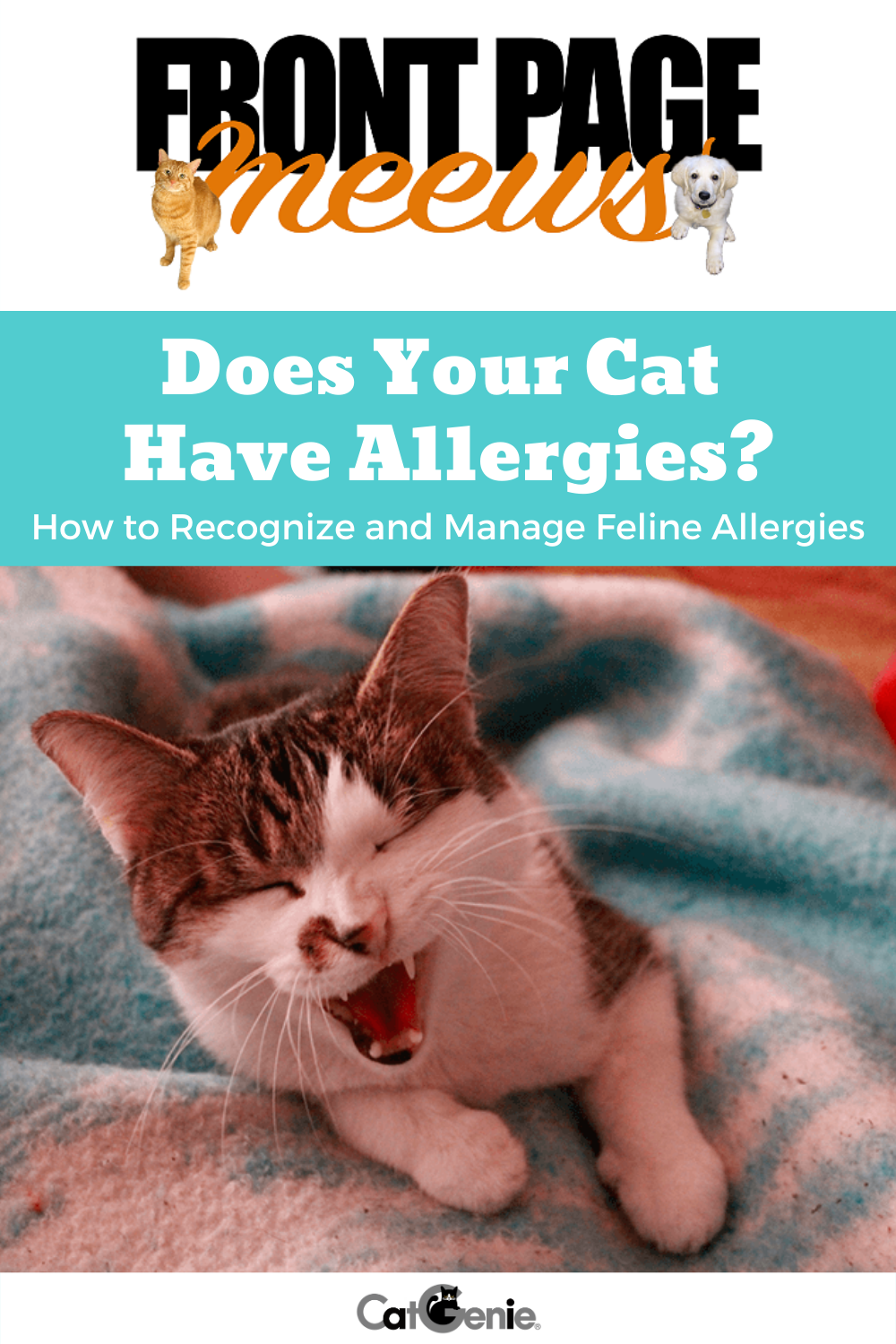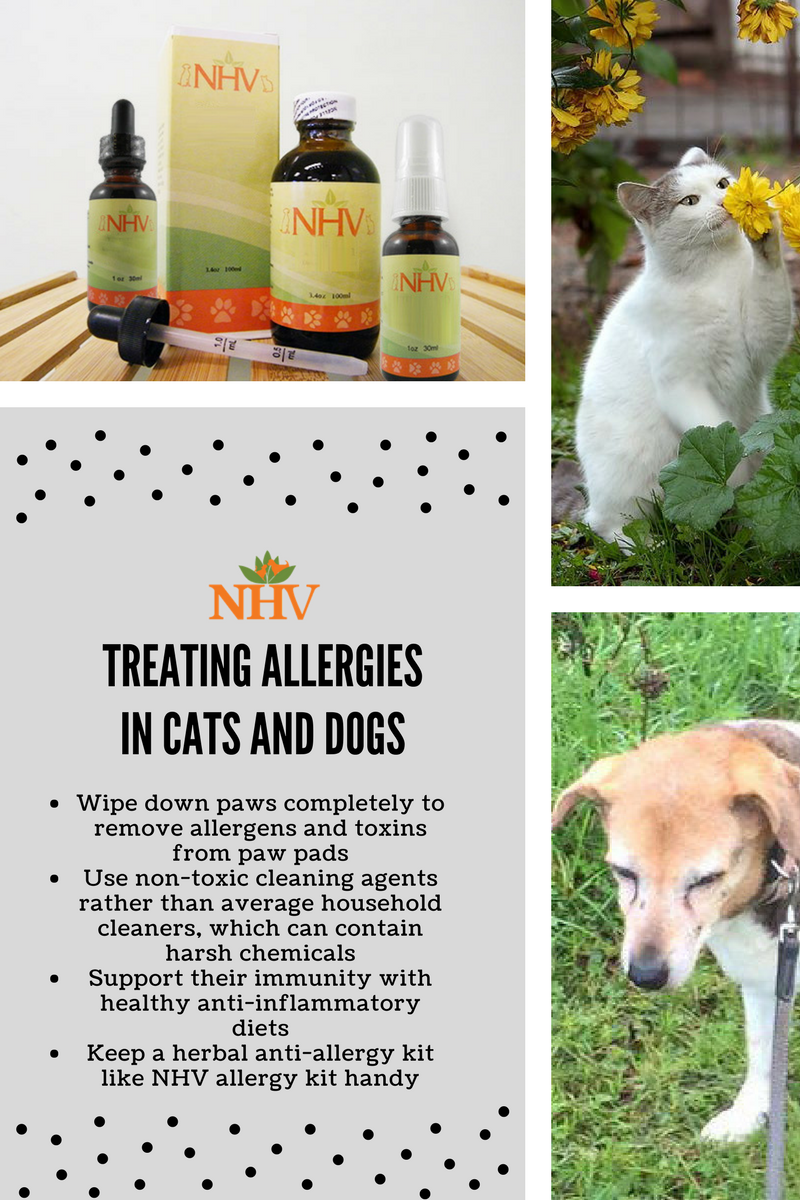Can Allergies Ever Lead To Something Serious
All cat breeds are potentially vulnerable to high pollen counts, with reactions ranging from mild to severe.
While seasonal allergies dont necessarily pose a serious threat to health, they can have a significantly negative impact on a cats quality of life.
Recognizing the signs and taking early action is crucial if your feline is going to receive the most effective help.
The longer a reaction goes untreated, the more chance there is of them suffering long-term effects. And you wouldnt want your cat living with watery eyes, or persistent itching, would you?
Seasonal allergies cannot be cured, they can only be managed. Once identified, the majority of allergies can be dealt with at home by removing or avoiding the offending allergen.
For obvious reasons, this isnt all that easy when dealing with pollen, especially if your feline is constantly out and about exploring.
What you can do to help is try and reduce the amount of pollen indoors by regularly vacuuming and dusting, cleaning their bedding and toys often. Brushing your cat daily will also hopefully keep any allergies at bay.
Symptoms Of Allergies In Cats
How do you know if your cat has allergies? Like dogs, cats often express their reaction to allergens through their skin. You may see one or more of these common signs.
- Scratching at the skin and ears
- Excessive grooming
- Hot spots
- Skin issues such as dry, patchy areas or rashes
- Skin or ear infections
- Lethargy
What Can You Do To Help Manage Your Cats Allergies
The most important component of managing your cats allergies is having them evaluated by your veterinarian and then following your vets advice. It is ideal to reduce exposure to known allergens or to avoid them entirely but that is not always possible. Some other things that can benefit your cat are:
- Preventatives. Use veterinarian-recommended flea, tick, and heartworm prevention year-round, even if you have an indoor-only cat.
- Litter. Try litter that is dust-free and fragrance-free. Each cat has a preference for litter, so ask your veterinarian for their advice.
- Baths. Routine bathing removes environmental allergens from the coat and helps with itching. Ask your veterinarian if there is a recommended shampoo product that would be safe and beneficial for your cat.
- Dust control. Minimize dust and dirt in the home with frequent vacuuming, dusting, and mopping. Be sure to include curtains and furniture. Make sure that any cleaning products used are safe for animals.
- Clean air. Use HEPA filters for your homes air handling system and try air purifiers.
- Beds. Wash pet and people bedding frequently. Your veterinarian might ask about the detergent you use in case it contains ingredients that could be allergenic.
- Nutrition. Feed a well-balanced diet recommended by your veterinarian.
- Supplements. Supplements, like fish oil, might be recommended by your veterinarian.
ZPC-01265
Recommended Reading: How Common Is Penicillin Allergy
About Dr Joanna Woodnutt Mrcvs
Dr. Joanna Woodnutt is a small animal veterinarian and writer who is passionate about helping owners to learn more about their pets in order to improve animal welfare. She loves to write and wants to empower owners to make the best decisions for their pets by giving them all the information they need. In her spare time, she takes consultations on the small island of Guernsey.
Types And Causes Of Cat Allergies

There are 4 common allergies in cats: environmental, fleas, food, and seasonal. This section elaborates these types of allergies and the different ways in which they may affect your cat.
Environmental allergies. Substances that cause environmental allergies include pollen, grass, fungi, mold, and dust. Your cat may also have allergies to things like cigarette smoke, perfume, and some cleaning products.
Flea allergies. When a small insect known as a flea bites your cat, it causes an allergic reaction that can be very irritating. The saliva from a flea bite can affect a catâs entire body, not just where the cat was bitten. Your veterinarian can help you choose the right flea prevention product to help protect your cat.
Food allergies. Some cats may have allergies to certain foods. This can cause skin itchiness, vomiting, or diarrhea. Your veterinarian can help you find out which foods are irritating your cat and create an appropriate diet.
Atopic dermatitis. When a cat experiences allergies, their bodies can often react with a skin condition called atopic dermatitis. With this condition, your cat may develop skin sores, scabbing, hair loss, and redness.
Environmental and flea allergies are usually treated by your veterinarian using the same meds, often including skin creams or a prescribed medication.
Also Check: What To Do When You Have Allergy Attack
Recognizing And Treating Pollen Allergies In Cats
- 44691 Views
Did you know that, like humans, cats can get pollen allergies too? Our cats can indeed become susceptible to environmental triggers and inhaled substances that cause allergies. Some cats may not develop these allergies until they are older, while for other cats their allergy symptoms may be exhibited early in life.
If left untreated, these pollen allergies can turn into skin itchiness, skin lesions, skin infections and respiratory symptoms including cold-like signs, which can become chronic. But what can you do to recognize and treat your cat if they have environmental allergies?
When To See A Vet About Your Cats Allergies
If youve done everything to reduce your cats exposure toseasonal allergens, and youre still seeing signs of irritation, schedule avisit to a vet to discuss possible medications or rule out other issues like aninfection or immune deficiency.
Sometimes a few lifestyle changes can be the differencebetween a sneezy feline and a happy, healthy cat! Looking for more cat care tips?Get advice from our team of experts or even submit cat care questions to Dear Tabby forpersonalized answers.
Read Also: Can Allergies Cause Sore Throat And Cough
Manage Irritation With Other Remedies
If youre wary about giving your pet a pill, there are other ways to soothe your pets symptoms, including natural remedies.
- Flea and tick preventative. Ensure your best friends skin wont be irritated by fleas.
- Anti-itch sprays or creams. Topical treatments will provide temporary relief, giving your pet a break from all that scratching. Only use products that are made for pets, as products marketed for humans may be ineffective or toxic to your furry friend.
If your pets allergies are severe, your veterinarian may prescribe steroids to help control inflammation. We know watching your animal suffer from allergies can be just as difficult as dealing with them yourself. No matter what method works best for you, we hope your pet is back to wanting extra belly scratches for pleasure not allergy relief in no time!
Signs Of Seasonal Allergies In Pets
Pets react to allergies differently than people. Although some pets will show signs of sneezing, runny eyes, coughing, and a runny nose, the most common sign of seasonal allergies in dogs and cats is incredibly itchy skin. Your dog or cat will be scratching, licking, rubbing, or chewing all day long. Your pet may even wake from a sound sleep to scratch. The constant scratching produces bald patches, bleeding, and sores. He or she may get one ear infection after the other.
Read Also: How To Get Rid Of Dust Mite Allergy
Causes Of Cat Allergies
Feline allergies can generally be broken down into a few different categories: food allergies flea allergies. seasonal allergies and environmental allergies.
If your kitty has food allergies, it means she has a negative reaction to certain ingredients in her food. Flea allergies can occur if your feline has an allergic reaction to flea bites.
Common culprits of seasonal allergies include mold, pollen, grass, fungi, and dust. Environmental allergies are similar, though they can occur year-round if your kitty is allergic to certain medications or substances such as cleaning products and certain fabrics.
Medical Treatment For Cats With Seasonal Allergies
If your veterinarian determines that your cat has seasonal allergies, a treatment plan will be developed. They may prescribe certain medications to help with itching and infection if it is present, and possibly topical medications for the skin, and/or ears. If allergy testing is performed, the results can be used to formulate allergen-specific immunotherapy , which is a treatment you administer to your cat at home.
Recommended Reading: Do You Have To Pay For An Allergy Test
Symptoms Of Pollen Allergies In Cats
While in most cats, pollen allergies will appear throughout their entire lives, some animals may not develop the condition until they are older. Each case of pollen allergies will be unique and symptoms will vary in severity. Common signs that may indicate your cat is suffering from pollen allergies may include:
- Scratching at eyes
- Ulcers or sores on skin from excessive scratching
- Lethargy
Trust The Care Of Your Pet To The Professionals At Everhart Veterinary Medicine

At Everhart Veterinary Medicine, our veterinary professionals strive to provide your pet with the very best of veterinary care. We believe that the best care for your pet should be provided by experienced, compassionate, and knowledgeable veterinary professionals. With two Maryland locations in both Baltimore and Pasadena, we are always ready to welcome your pet as a new patient! Give us a call today at 410-355-3131 or 410-793-7670! For more information, as well as updates on veterinary news and topics, visit us on , , or !
Read Also: Can Allergies Give You Bronchitis
When Should You See A Veterinarian
If you have done all you could to reduce your cats exposure to seasonal allergies but continue to see signs of irritation, pay us a visit at All About Cats Veterinary Hospital in the Kirkland area. We may recommend a topical solution for itching, or in severe cases, prescription may be needed to lessen the inflammatory response caused by the histamine in your kittys body. We understand that it’s hard to see your cat miserable and uncomfortable. We will work with you to make sure you have a cat thats purr-fectly happy and healthy all year long!
Common Symptoms In Allergic Cats
The signs of seasonal allergies are easy to spot, but many pet parents dismiss them as if theyre no big deal. While allergies usually arent life-threatening, theyre certainly aggravating for your kitty! Paying attention to the signs puts you one step closer to seeking the allergy treatment your cat deserves.
Here are the most common signs to look for:
Also Check: Is Flaxseed A Nut Allergy
Signs Of Cat Seasonal Allergies
Cats can have seasonal allergies, too. Heres what to look out for and how to treat it.
Seasonal allergies can happen to anyone. It can happen to you, your dog, and yes, your cat. Some cats may develop seasonal allergies that can make them, like anyone else, quite miserable. To help your cat survive its allergy season, here are the signs of cat seasonal allergies and allergy prevention methods.
How Seasonal Allergies In Cats Work
Allergies occur when the immune system mistakes a certain molecule to be harmful when it is not. The body then produces histamines to combat that molecule, which can result in some uncomfortable symptoms. The most common particles that cause cat seasonal allergies are dust, pollen, grass, mold, and fungi.
Recommended Reading: How To Stop Sneezing From Allergies Home Remedies
What Are Allergies In Cats
Allergies are an abnormal immune response to a harmless stimulus. When your cats body contacts an allergen through their skin or after breathing it in, a chain reaction starts thats out of proportion to the danger your cat is ina hypersensitivity reaction.
Immune system sentinel cells release cell signals that cause itching, swelling, and redness.
Cats are not usually born with allergies- they develop as your cat ages. Cats are usually diagnosed between six months and three years, but as diagnosis is often difficult, cats have been diagnosed as old as 14 years!
The Only Downside Of Spring
Whenever spring rolls around, you might notice your cat starts sneezing a lot more than normal.
Seasonal allergies are pretty common in humans, so you might be wondering if cats can get them, too.
The Dodo reached out to Dr. Lydia Harbour, a veterinary dermatology resident at Dermatology for Animals in Phoenix, to find out more about cat seasonal allergies and what to do if you suspect your cat has them!
Recommended Reading: How Does Stress Affect Allergies
Diagnosis Of Pollen Allergies In Cats
Your veterinarian will need to conduct a thorough physical exam of your cat in order to accurately diagnose pollen allergies. Since most allergies present with similar symptoms, your vet will need to rule out other potential aggravating environmental, food or toxins they may have come in contact with. It will be important for you to provide your vet with a thorough physical and medical history of your cat. If your cat has recently had any changes in food, bedding or has been exposed to unusual chemicals, this information could help differentiate between allergies to pollen and something else. You should also document the progression of the symptoms, including whether your cat has always suffered from the condition and whether the symptoms improve or worsen at certain times of the year or after certain activities, such as being outside.
Your vet may also take a small smear from the tissue inside your cats nose and mouth. This will allow them to analyze the cells for any inflammatory responses that would indicate allergies. In order to rule out allergies to other substances, your vet may order short term food trials. This will involve modifying your pets diet to special prescription foods that contain minimal ingredients in order to test whether food is the potential culprit.
Avoid Contact With The Main Allergen Sources

Once you know for sure what kind of allergy your cat has, you know how to help her feel better.
Here are a few tips:
| Tips against cat pollen allergy | |
|---|---|
| Prevent contact to allergen source: | Just like with humans, the most effective way to protect your cat from an allergic reaction is to prevent contact with the allergens in question. |
| Get informed: | |
|
|
| Keep kitty inside: | If you choose to keep your cat inside while the pollen they are allergic to is outside, take extra care when airing your home. |
| Get fresh air: | Most seed and pollen producing plants bloom during the day, so you can significantly help your cat by only opening windows after sunset. |
Read Also: Can Allergies Cause Your Nose To Bleed
Seasonal Allergies In Dogs & Cats
Many people experience seasonal allergies, but did you know seasonal allergies can afflict our dogs and cats, too? Did you also know that the immunological response to the allergens, symptoms, treatments and management strategies can be similar in humans, dogs and cats, too? Lets talk about seasonal allergies in our pets.
What is an immunological response?
When pets breathe in an allergen , or if they step on the mold or pollen in the outdoors and then lick it off, the immune system reacts by producing excessive histamine which causes your cat or dog to experience allergy symptoms. Common symptoms can include itching, hives, eye discharge, sneezing, hair loss and hot spots, among others.
What are the treatments?
Your veterinarian will prescribe the appropriate medical treatment for your pets seasonal allergies, however, there are also different management strategies you can employ that may help. Here are a few tips on things you can do to help manage your pets allergies:
In addition to seasonal environmental allergies, pets can also become allergic to indoor allergens, such as smoke, dust or even chemicals from laundry detergents. Essentially, many allergens that can trigger symptoms in humans can also affect our pets. The more frequent you employ these management strategies, the better able youll be to control their allergies, or at least make their experience as comfortable as possible.
How Are Seasonal Allergies In Cats Diagnosed
As you can see from the list above, many signs of allergy can also be signs of other problems such as skin or respiratory infection. If your cat is experiencing any signs or symptoms that are new, changing, or concerning to you, it is very important to take your cat to the veterinarian for a thorough examination.
To help your veterinarian determine if your cat has allergies or some other medical condition, provide a complete snapshot of your cats health and behavior. For example, if your cat has always groomed herself at the same time of day but is now grooming herself around the clock, that can be very important information for your vet. Tell your veterinarian about any observations youve made related to your cats symptoms, including things like:
- Any environmental changes, especially in their living space
- Diet changes
- Bedding changes
- Different or worsening symptoms based on exposure to the outdoor environment
- Any topical products used on your cat like shampoos, parasite prevention, sprays, etc. as well as topical products used on other household animals.
After performing a thorough examination and evaluating the medical history you provided, your veterinarian might recommend some tests to better determine the cause of your cats signs, including:
Read Also: Can You Get Sick From Allergies

